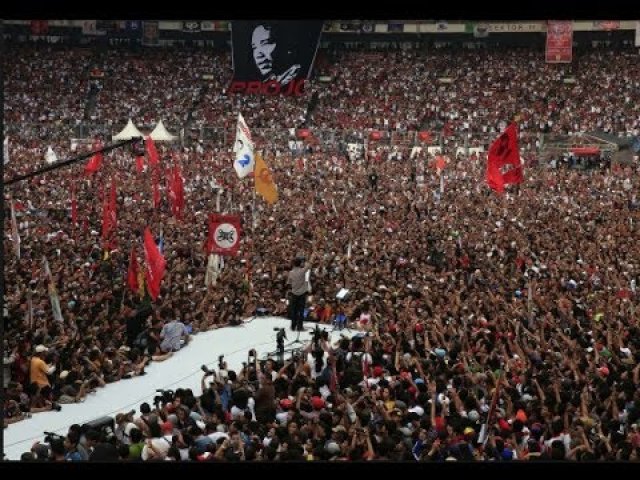
The official results of the July 9 Indonesian presidential elections are not expected till at least July 22, but many unofficial “quick count” surveys and exit polls have proclaimed a winner.
Most of these unofficial polls have declared that former Jakarta governor Joko Widodo (popularly known as Jokowi) has defeated his sole challenger — sacked Suharto dictatorship general Prabowo Subianto — by a margin of up to 4%.
According to the CSIS-Cyrus quick count, Jokowi and his vice-presidential candidate Jusuf Kalla won 52% of votes compared to 48% for Prabowo Subianto and his running mate Hatta Rajasa.
Kalla was Indonesian vice-president from 2004-09 and former chairperson of former dictator Suharto’s Golkar party. Hatta is linked to the outgoing presidential administration of Susilo Bambang Yudhoyono.
Despite the lack of official results, both Jokowi and Prabowo have claimed victory and held victory celebrations. This has led to fears that a disputed election result may lead to serious conflict.
Australian National University professor Edward Aspinall, a widely quoted Indonesian scholar, told Green Left Weekly from Indonesia that he was “completely confident” Jokowi won the election.
“All of Indonesia’s professional and respected survey institutes that conducted quick counts produced results that showed him with a clear-cut lead.
“These institutes have records of producing quick counts that very accurately predict the final results. It is close to a statistical impossibility that they got it wrong this time.”
“The significance of Prabowo’s defeat,” he added, “is that it has prevented a return to the authoritarianism of the Suharto period and it will keep open democratic space to articulate and defend popular interests.
“A Prabowo victory would have represented a decisive defeat for Indonesian democracy.”
Aspinall has published an expose of Prabowo's rise to immense wealth and power under the Suharto dictatorship. He has also showed that Prabowo, who became Suharto's son-in-law, has a record of anti-democratic behaviour.
However, Aspinall conceded that “many of Indonesia's established elite politicians and oligarchs early on offered to back Jokowi because they saw him as having the higher chance of victory”.
Interestingly, he did not accommodate all such requests, refusing to meet with some oligarchs, for instance. Members of Indonesia's established elite are well-represented in the coalition supporting Jokowi, but Aspinal said “most of the most authoritarian elements backed Prabowo”.
“Prabowo is certainly going to try to delegitimisethe result and steal the election. Sponsoring fake quick counts can have no other purpose than preparing the ground for fraud in the counting process.
“I am reasonably confident that the margin of Jokowi’s victory will make this task too difficult. However, defending this victory will require great vigilance on the part of his supporters.”
Aspinall's concerns about the possible “stealing” of the election result was echoed by a number Indonesians who supported Jokowi in the elections.
Anom Astika, a former leader of the radical People's Democratic Party (PRD) that played a leading role in the movement that eventually brought down the Suharto dictatorship, spent three years as a political prisoner of the dictatorship. He was one of many PRD and other pro-democracy activists jailed, abducted, murdered or disappeared by the Suharto regime.
As the former commander of the army special forces (Kopassus), Prabowo was implicated in the kidnapping of activists in 1997/98 when the Suharto regime was on the verge of being toppled.
Nine of the abducted were found alive, one was found dead and 13 have never been found. The disappeared include radical poet Wiji Thukul.
Today Anom is a media analyst and lecturer in Jakarta and he is worried that Prabowo, backed by big business conglomerates, may have the means to bribe the election commission into rigging the official result.
“Jokowi's volunteer associations and groups need to guard the votes,” he told Green Left Weekly, “and expose the false claims of a Prabowo win by institutions with poor credibility.”
“The seven or eight survey institutions whose quick counts found that Jokowi has won the election have had good credibility for more than five years. But now the association of survey institutions will check the methodology of all the surveys.”
[Further reading: "Prabowo's game plan", by Ed Aspinall and Marcus Mietzner in New Mandala and "Trouble in the East" by Ed Aspinall in The Conversation.]